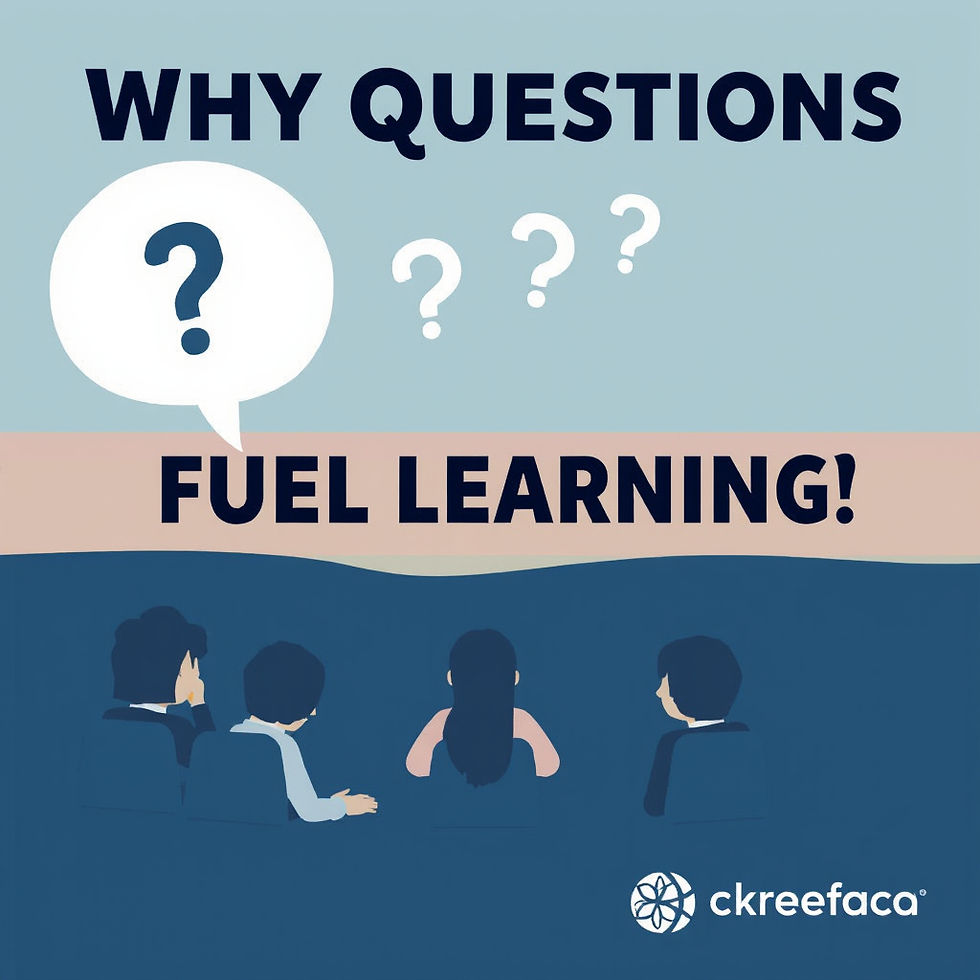The Cognitive Power of Questions: Why Inquiry Fuels Learning and Innovation
- Laura Degiovanni ䷼ | CEO TiiQu & Founder QuTii Foundation
- Oct 13, 2025
- 4 min read

In educational research, the humble question has long been viewed as a pedagogical tool. Yet recent advances in cognitive science suggest it is far more than that — questioning is a fundamental mechanism of learning, influencing attention, encoding, recall, and even motivation.
1. From Information Exposure to Cognitive Engagement
A central finding across decades of learning research is that active retrieval strengthens memory more effectively than passive review — a phenomenon known as the testing effect or retrieval practice (Roediger & Karpicke, 2006).When a learner answers a question, the act of reconstructing knowledge enhances neural consolidation and improves long-term retention (Karpicke & Blunt, 2011).
Moreover, when learners generate their own questions, they experience what is known as the generation effect — self-produced information is encoded more deeply and retrieved more readily (Slamecka & Graf, 1978).
In short, questioning transforms learning from input processing to knowledge construction.
2. Curiosity, Dopamine, and the Neural Substrate of Questions
Curiosity-driven questioning also recruits the brain’s reward circuitry. Functional neuroimaging work at the University of California, Davis (Kang et al., 2014, Neuron) showed that curiosity activates the caudate nucleus and midbrain dopaminergic regions, enhancing memory even for incidental information presented during the period of heightened curiosity.
This implies that asking a meaningful question does not merely direct attention; it primes the brain for learning through neurochemical modulation. In cognitive terms, questions create a prediction gap — a discrepancy between what is known and unknown — that the brain strives to close.
3. Metacognitive and Pedagogical Dimensions
Questioning is also a form of metacognitive regulation: learners monitor their understanding by identifying uncertainties, thereby adjusting study strategies (Pressley & Ghatala, 1990).
In classroom contexts, studies show that teacher-posed and student-generated questions significantly improve conceptual understanding and retention (Rosenshine, Meister & Chapman, 1996).The Question Formulation Technique (Rothstein & Santana, 2011) and related frameworks systematically train learners to generate, refine, and prioritize questions — a process correlated with gains in critical thinking and self-efficacy (Chin & Brown, 2002).
Within Bloom’s revised taxonomy (Anderson & Krathwohl, 2001), questioning naturally spans cognitive levels from remember and understand to analyze and create, making it a diagnostic and developmental tool across domains.
4. Cognitive Load and Optimal Question Design
Not all questions are equally effective. Research on cognitive load theory (Sweller, 1988) warns that poorly sequenced or overly frequent questioning can overwhelm working memory and impair schema formation.Effective questioning therefore involves strategic pacing and scaffolded complexity: low-level factual questions to stabilize retrieval, followed by higher-order prompts that require transfer and synthesis.
Adaptive digital platforms now operationalize these insights by sequencing questions based on learner performance and latency — a direction aligning pedagogy with computational learning science.
5. Inquiry as a Catalyst for Innovation
Outside formal education, the same principles underpin creative and scientific breakthroughs. The “What if?” framing used in design thinking (Brown, 2009) exemplifies applied metacognition: reformulating problems as open-ended questions to expand the solution space. Similarly, in organizational learning, double-loop questioning (Argyris & Schön, 1978) surfaces hidden assumptions, fostering adaptive expertise.
Across contexts, the quality of the question determines the quality of the insight.
6. From Research to Application: AI and the Pedagogy of Questioning
Emerging AI systems can now model this cognitive dynamic. Platforms such as pdf2qa, for example, transform static documents into structured networks of questions and answers, enabling users to engage in retrieval practice and conceptual mapping rather than passive reading.
By algorithmically identifying main ideas, ambiguities, and inferential gaps, such systems simulate expert questioning strategies — effectively scaling the benefits of inquiry-based learning to individual study and corporate knowledge management.
In doing so, they bridge a long-standing gap between information access and cognitive engagement.
7. Why Mastering Questions Matters for the Future of Learning
In an era where AI can generate limitless answers, the differentiating human skill is not recall but inquiry. Learning to craft precise, purposeful, and generative questions is both a cognitive discipline and an ethical one — it shapes how we interpret evidence, challenge bias, and pursue understanding.
As Dewey (1933) observed, “A problem well put is half solved. ”To that we might now add: a question well designed is half learned.
📚 Selected References
Anderson, L.W., & Krathwohl, D.R. (2001). A Taxonomy for Learning, Teaching, and Assessing.
Argyris, C., & Schön, D. (1978). Organizational Learning: A Theory of Action Perspective.
Brown, T. (2009). Change by Design.
Kang, M.J. et al. (2014). “The Wick in the Candle of Learning: Epistemic Curiosity Activates Reward Circuitry.” Neuron, 84(2), 450-456.
Karpicke, J.D., & Blunt, J.R. (2011). “Retrieval Practice Produces More Learning than Elaborative Studying.” Science, 331(6018), 772-775.
Pressley, M., & Ghatala, E. (1990). “Self-Regulated Learning: Monitoring Learning from Text.” Educational Psychologist, 25(1).
Roediger, H.L., & Karpicke, J.D. (2006). “Test-Enhanced Learning.” Psychological Science, 17(3), 249-255.
Rothstein, D., & Santana, L. (2011). Make Just One Change: Teach Students to Ask Their Own Questions.
Slamecka, N., & Graf, P. (1978). “The Generation Effect.” Journal of Verbal Learning and Verbal Behavior, 17(5), 593-608.
Sweller, J. (1988). “Cognitive Load During Problem Solving.” Cognitive Science, 12(2), 257-285.
.png)



Comments